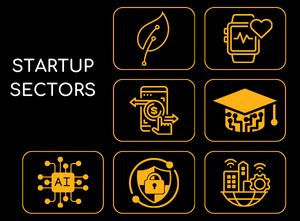
While Nobody Studios continues its quest to build 100 companies in the next five years, expanding our global reach is inherent to our success. As we begin to establish footprints in different countries and regions, several things must be considered.
When we enter new countries, some of our first steps include building relationships with chambers of commerce, universities, local accelerators and incubators, and family-run offices and corporations. From here, we look to establish the studio’s presence by supporting entrepreneurs and entrepreneurial groups at networking events, conferences, skill-building sessions, and others.
Through this initial process, we start to understand how local and regional culture impacts consumer behavior and preferences. We develop this understanding by partnering with local advisors, consistently maintaining an aura of curiosity, questioning our mental models, and leveraging our current studio leaders' deep language and cultural experience in the country/region.
From here, we begin to focus on some key considerations for potential new local/regional venture:
 Market Size & Potential: Global markets may often offer larger customer bases and growth opportunities but may also come with higher competition and regulatory challenges. Local and regional markets may have a more limited scale but could provide more accessible entry and quicker validation of business models.
Market Size & Potential: Global markets may often offer larger customer bases and growth opportunities but may also come with higher competition and regulatory challenges. Local and regional markets may have a more limited scale but could provide more accessible entry and quicker validation of business models.
Regulatory Environment: Global markets may require compliance with diverse regulations, while local or regional focus may involve dealing with a more familiar regulatory landscape.
Risk Management: Diversifying across multiple markets can mitigate risks associated with economic downturns or regulatory changes in specific regions. However, spreading resources too thinly across multiple markets may dilute focus and hinder growth.
Strategic Partnerships and Networks: Local connections and relationships may provide advantages in regional markets, while global expansion may require building partnerships on an international scale.
When we decide to create a new company or acquire an existing start-up that could initially solve a local/regional problem, we often consider replication vs. creation.
Replication and creation represent two distinct approaches in the startup ecosystem, each with advantage and challenges. Here are some ways we see them differ:
Replication
Definition: Duplicating an existing business model or idea in a different market or context.
Advantages:
- Potential of Lower Risk: Since the business model has already been proven successful elsewhere, there may be a reduced risk of failure compared to creating something entirely new.
- Established market demand: Replicating a successful business model implies there may be existing market demand for the product or service.
- Proven methods: Processes, strategies, and best practices are often already established, reducing the need for trial and error.
Challenges:
- Competition: Entering a market with a replicated business model often means facing established competitors who may have a first-mover advantage.
- Adaptation: Cultural, regulatory, or market differences may require the replicated model to be significantly adapted, which can be challenging.
- Innovation limitations: Replication typically involves mimicking existing ideas rather than fostering innovation, which may limit long-term growth potential.
Creation
Definition: Creation involves developing a new and innovative business idea or model that addresses a specific market need or problem.
Advantages:
- Innovation potential: Creating something new opens the door to innovation and disruption, potentially leading to more significant market differentiation and competitive advantage.
- Scalability: Innovative ideas often have the potential for rapid scalability, attracting investors and facilitating growth.
- Flexibility: Creators can shape their vision without being bound by existing models or methodologies.
Challenges:
- Uncertainty: Creating something entirely new entails a higher degree of uncertainty and risk, as there is no guarantee of market acceptance or demand.
- Validation: Validating a new idea can be challenging and require significant resources and time.
- Market education: Introducing a novel concept may require educating the market about the problem it solves and its value proposition, which can be slow and costly.
We are currently observing a trend that leans heavily toward replication vs. creation in the international start-up markets we are expanding into, with most of these ideas taken from the US and some European markets.
Specific startup sectors gaining momentum include:
 Sustainability and Green Tech: Startups focusing on renewable energy, sustainable agriculture, waste management, and eco-friendly products are rising as environmental concerns become more pronounced globally.
Sustainability and Green Tech: Startups focusing on renewable energy, sustainable agriculture, waste management, and eco-friendly products are rising as environmental concerns become more pronounced globally.
Healthtech and Telemedicine: The COVID-19 pandemic accelerated the adoption of telemedicine and digital health solutions. Startups in this space are innovating to improve access to healthcare, remote patient monitoring, and health data management.
FinTech and Digital Payments: With the increasing digitization of financial services, there's a growing demand for FinTech solutions, including digital banking, peer-to-peer lending, blockchain-based payments, and decentralized finance (DeFi).
EdTech and Online Learning: The digital transformation of education has led to the emergence of EdTech startups offering online courses, tutoring services, educational apps, and e-learning platforms catering to learners of all ages.
Artificial Intelligence (AI) and Machine Learning (ML): AI and ML technologies are integrated into various industries, including healthcare, finance, marketing, and cybersecurity. Startups leverage these technologies to automate processes, improve decision-making, and enhance customer experiences.
Cybersecurity and Data Privacy: With cyber threats increasing in frequency and sophistication, there's a growing demand for cybersecurity solutions and data privacy tools. Startups focusing on threat detection, encryption, identity management, and compliance are seeing significant growth.
Smart Cities and Urban Innovation: Startups are developing solutions to address urban challenges such as traffic congestion, pollution, energy consumption, and public safety. These solutions often leverage IoT devices, data analytics, and AI to create more efficient and sustainable cities.
In our relentless pursuit of building 100 companies within the next five years, expanding our global reach is a cornerstone of our success. As we embark on establishing footprints in diverse countries and regions, strategic considerations become paramount. Through careful planning and unwavering commitment, we are poised to cultivate a thriving ecosystem of innovation, transforming ideas into impactful ventures on a global scale.
ABOUT THE AUTHOR
Michael Landers
Global Director of Growth & Development, Nobody Studios
Over the past 20 years, Michael has worked with global executives, leaders, and teams from leading organizations to build essential skills in global leadership, cross-cultural communication, sales and customer service excellence, sustained employee engagement, and cultural diversity and inclusion. His workshops, seminars, and speaking events have drawn more than 125,000 thousand people on five continents. Although US American, Michael was raised in countries throughout Latin America and also lived in Japan as an adult. He is also the author of the bestselling book Culture Crossing, the essential primer to working, living, and thriving in today’s increasingly multicultural marketplace and communities, and the recently released Present Company: Cultivating Cultures of High Performance in Teams and Organizations.
1 Comment
-
Irrationally and Intentionally Global!
Gonna require a irrationally intention global team.
Put me in Coach!
Grandpa



